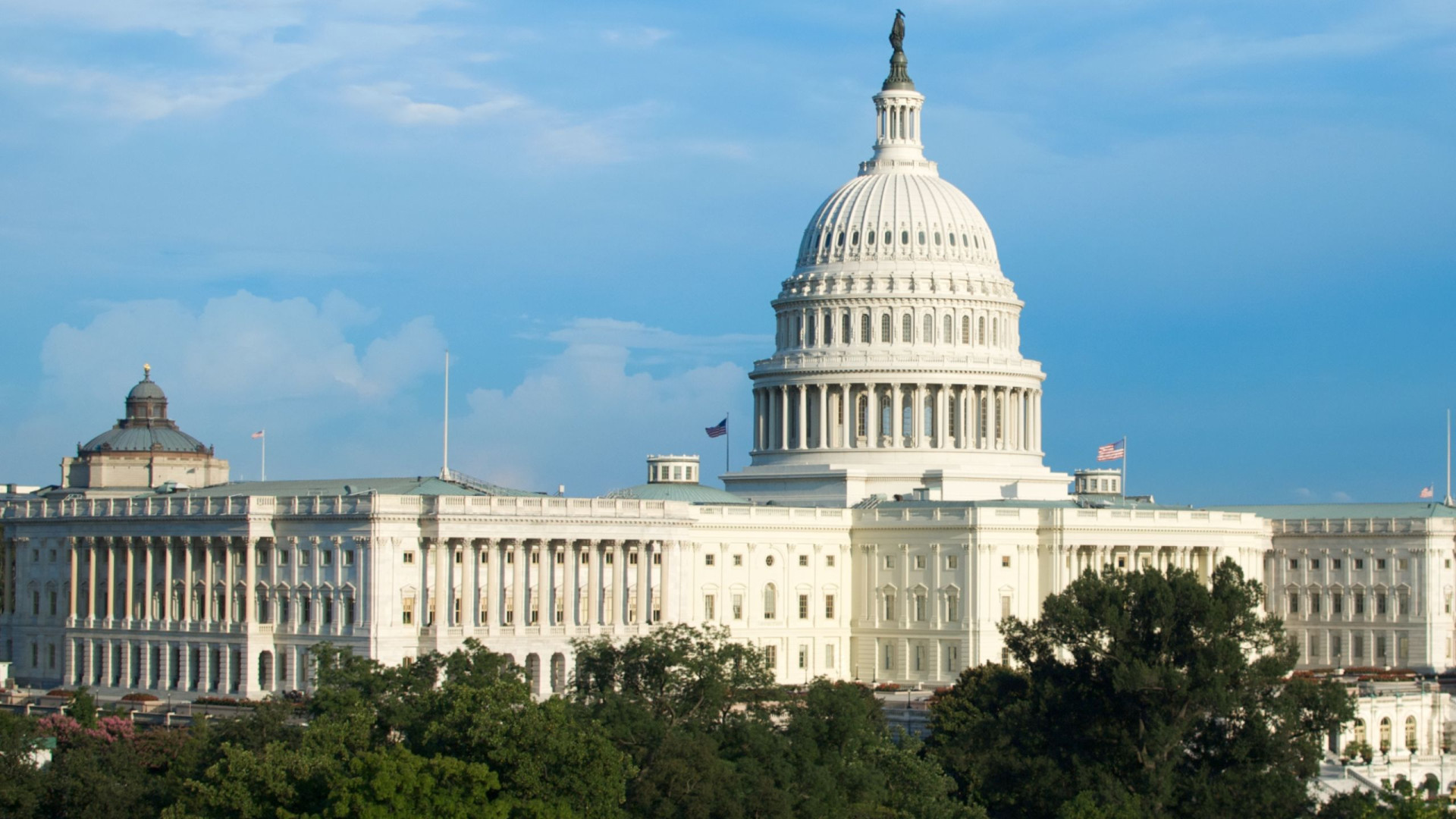Updated on 14.07.2025
US President Trump signed a spending package called the "One Big Beautiful Bill" on July 4, 2025. We shed light on the impact of the new law on US immigration law.
Share article:

The One Big Beautiful Bill Act, officially known as H.R. 1 in the 119th Congress, is a comprehensive legislative package that was passed by the US House of Representatives on July 4, 2025. It bundles far-reaching changes in the areas of
The law is primarily aimed at US domestic and border policy. It does not fundamentally change who is eligible for immigration benefits in the United States, nor does it create new legal pathways, but it significantly increases resources for immigration enforcement and increases the cost of many immigration programs.
Public Law No: 119-21 contains comprehensive tax changes, an increase in the debt limit and far-reaching reforms in the areas mentioned above. The aim is to stabilize public finances through additional revenue and spending cuts.
The One Big Beautiful Bill Act combines new fees and a tax on foreign remittances with savings in the social sector (including Medicaid) and investments in border security, energy production and industrial policy. Environmental regulations will be relaxed to promote domestic energy projects. Overall, the law aims to achieve greater fiscal discipline, economic self-reliance and stricter immigration controls - all with a focus on tackling the rising national debt.
The law allows more new debt to be taken on in the short term, but relies on structural measures to curb the deficit in the medium term.
The balance between borrowing and budgetary discipline is at the heart of the law and is politically highly controversial.
The spending package allocates around 170 billion US dollars for the immigration enforcement and border protection. The following changes apply to US immigration law:
More than 100 billion US dollars will be allotted to U.S. Immigration and Customs Enforcement (ICE) and U.S. Customs and Border Protection (CBP) by 2029 – which is almost double the previous budgets.
This includes around 45 billion US dollars for detention centers, 46 to 46.5 billion US dollars for the border fence as well as technology and infrastructure, and around 14 billion US dollars for the implementation of increased deportation measures.
Furthermore, 10,000 new ICE and CBP agents are to be hired by 2029, which could make ICE the largest federal police force in the United States.
The US government is planning to significantly expand its capacity to detain "illegal" migrants. In future, up to 100,000 people are to be detained every day. In addition to the expansion of existing facilities, the construction of new detention centers is planned – such as the "Alligator Alcatraz" project in the Everglades, which is to provide space for up to 5,000 detainees. At the same time, an increase in the daily detention quota by the immigration authority ICE to up to 3,000 people is planned. The aim is to take tougher action against illegal migration.
To speed up pending immigration proceedings, the US government is planning additional funding of around 1.25 billion US dollars for the U.S. Immigration Courts. This is intended to reduce backlogs and make procedures more efficient. However, critics complain that these investments fall far short of the much higher spending on detention capacity and enforcement measures. In addition, the number of EOIR (Executive Office for Immigration Review) attorneys is still limited to a maximum of 800 – even at peak times – which is likely to limit the effectiveness of the measures.
The law sets up a transfer tax of 1% to 3.5% on money transfers from non-citizens to other countries. It is still unclear which types of transfers – such as cash, online payments or credit card transactions – will be affected and to what extent. In addition, tax breaks for health insurance premiums and Medicare are to be severely restricted. According to the current status, temporary workers with US visas such as H-1B, L-1 or E-1 / E-2 would be largely excluded from this.
The Act provides for numerous new fees and fee increases for various immigration applications and procedures. Below we provide an alphabetical overview of the most important fee adjustments under the One Big Beautiful Bill Act (OBBB) – relevant for business travelers, companies, employees on assignment and private individuals.
| FEE TYPE | Previous fee | New fee according to OBBB | Affected applicants | Comments |
| ESTA Fee (Visa Waiver Program) | 21 $ | 40 $ | VWP travelers (tourist / business) | Gültigkeit bleibt bei 2 Jahren |
| EVUS System Fee (Electronic Visa Update System) | 0 $ | 30 $ | Chinese nationals with a 10-year visitor visa of type B-1 / B-2, B-1, or B-2 | |
| I-94 Fee (Arrival / Departure Record) | 6 $ (only land border) |
24 $ total | all those applying for an I-94 for entry by land or on selected ferries | to date, only intended for border crossings by land or via selected ferries |
| Visa Integrity Fee | - | 250 $ | all applicants for nonimmigrant visas (e.g. B, E, F, H, L) | refunds possible under strict conditions |
In addition, the law contains numerous other fee adjustments in various areas of US immigration and residence law. For example, a fee is to be charged for the first time in the asylum procedure, both for newly submitted applications and for ongoing procedures. A new increased fee structure for asylum seekers and persons with temporary residence status will also be introduced for the Employment Authorization Document (EAD). In the area of Temporary Protected Status (TPS), a uniform flat fee is planned for the future. Applications for adjustment of status to a Green Card ("I-485, Application to Register Permanent Residence or Adjust Status") are to be processed via a higher overall fee in future. Further areas and details can be found in the full legislative text.
The revenue from these increased fees will be used to fund various US immigration agencies and programs and US law enforcement agencies, including the Executive Office for Immigration Review, U.S. Immigration and Customs Enforcement (ICE), U.S. Customs and Border Protection (CBP), and the Office of Refugee Resettlement.
It is not yet clear when exactly the respective fees will come into force and will be implemented. It can be assumed that the changes will be introduced in the current year 2025, e.g. at the start of the US Fiscal Year 2026 on October 1, 2025, or at the start of 2026 when the "One Big Beautiful Bill" comes into force.
The U.S. Department of Homeland Security (DHS) will communicate exact implementation dates and administrative details shortly.
Applicants will face significantly higher costs for many immigration procedures, new fee obligations for status extensions and adjustments and additional financial hurdles – especially for vulnerable groups such as asylum seekers and TPS holders.
In addition, some of the fee increases are linked to inflation and may be adjusted further in the coming years.
There is no exemption from fees for certain groups of people.

The Visa Integrity Fee is a one-time fee of 250 US dollars for applicants for US nonimmigrant visas (e.g. B, E, F, H, J, L). According to the new law, it will be mandatory for new applications and renewals as part of the visa application process at the US consulate.
The fee is charged on top of all existing regular visa and administrative fees, i.e. in addition to the usual application costs such as the nonimmigrant visa fee, reciprocity fee, etc.
As mentioned, the changes only affect visa categories for temporary stays in the US. The only exceptions are nonimmigrant visas for diplomats and official government travelers such as A-1, A-2, G-1 to G-4.
In addition, applications for a Green Card (immigrant visa) and related immigration procedures are generally not affected by the new fee, as they enable permanent residence in the United States.
Finally, travelers to the United States who do not require a visa (e.g. participants in the Visa Waiver Program with ESTA) do not have to pay the fee, as no visa is issued.
The fee can be refunded retrospectively if:
The Visa Integrity Fee is to be levied by the relevant US consulates at the time of issuance of a US nonimmigrant visa and applies to all persons to whom such a visa is granted, i.e. issued. However, it is currently unclear exactly how this additional fee will be paid.
Furthermore, there is still no information on how to apply for a refund (e.g. after the visa has expired).
As mentioned, it is not yet clear exactly when the new fees will come into force and will be implemented. An introduction in the course of 2025 or at the start of the US Fiscal Year 2026 (FY) on October 1, 2025 seems possible – alternatively, the law could come into full force in 2026.
The introduction of the Visa Integrity Fee in the aforementioned amount of 250 US dollars would significantly increase the already considerable costs for nonimmigrant visas. The introduction of such an additional fee is therefore not uncontroversial.
The One Big Beautiful Bill Act entails some significant cost increases when applying for numerous US immigration benefits - for example for ESTA or US nonimmigrant visas. However, the focus of the bill is clearly on tightening the enforcement of existing immigration regulations, in particular by increasing the staffing and funding of agencies such as ICE and CBP.
We monitor developments on an ongoing basis and provide information on all relevant changes. If you need assistance with your visa application, entry or the selection of the appropriate visa procedure, we will be happy to assist you with our many years of experience as a specialized US visa agency.
Date:
Wir und unsere Partner nutzen Cookies, um personenbezogene Daten wie z.B. Browsing-Daten zu speichern und abzurufen, um z.B. Inhalte und Werbung bereitzustellen und zu personalisieren sowie die Verwendung der Website zu analysieren und das Benutzererlebnis zu verbessern. Sie erfahren mehr über die Zwecke, für welche wir und unsere Partner Cookies einsetzen, wenn Sie unten auf den Button „Cookie Einstellungen“ klicken. Hier können sämtliche Einstellungen auch geändert werden. Nachträglich kann man jederzeit seine Cookie-Auswahl überdenken oder seine Einwilligung widerrufen, indem man auf den Link zu den Cookie-Einstellungen im Footer unserer Webseite klickt. Beachten Sie bitte, dass das Blockieren einiger Cookie-Typen unsere Möglichkeiten zur Bereitstellung von auf Ihre Interessen zugeschnittenen Inhalten haben kann oder einige Funktionen der Webseite nur eingeschränkt zur Verfügung stehen.
Durch klicken auf “Alle Cookies akzeptieren” stimmen Sie unserer Nutzung und der Weitergabe Ihrer Daten an unsere Partner zu.